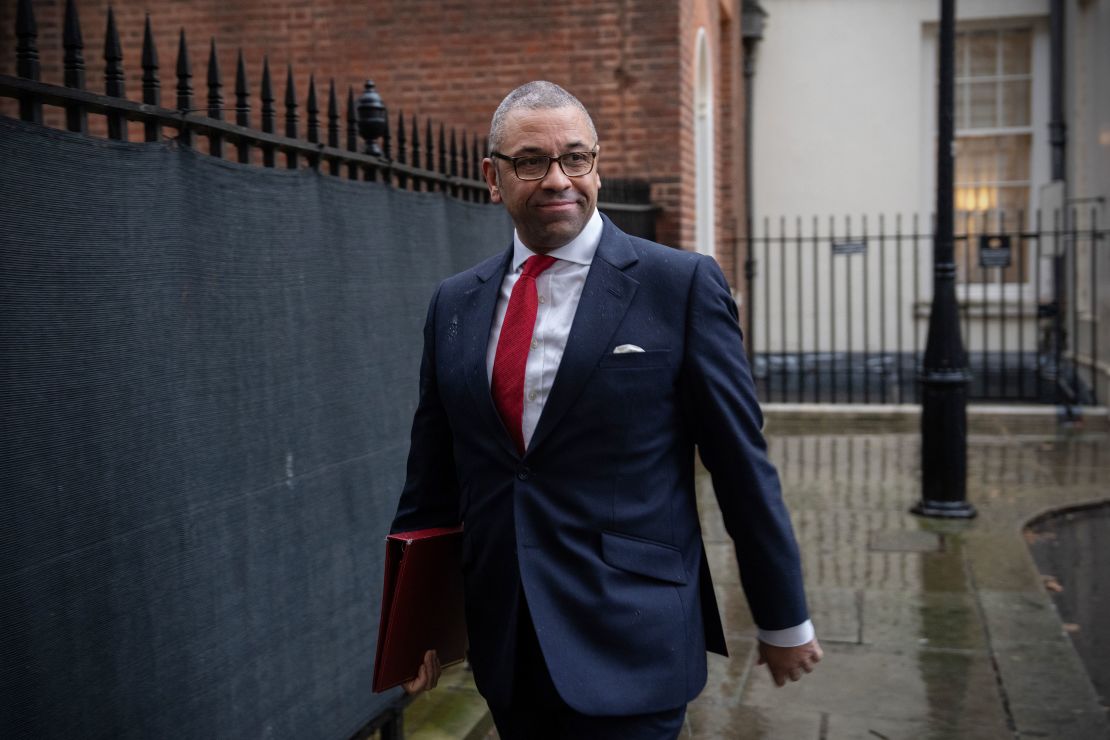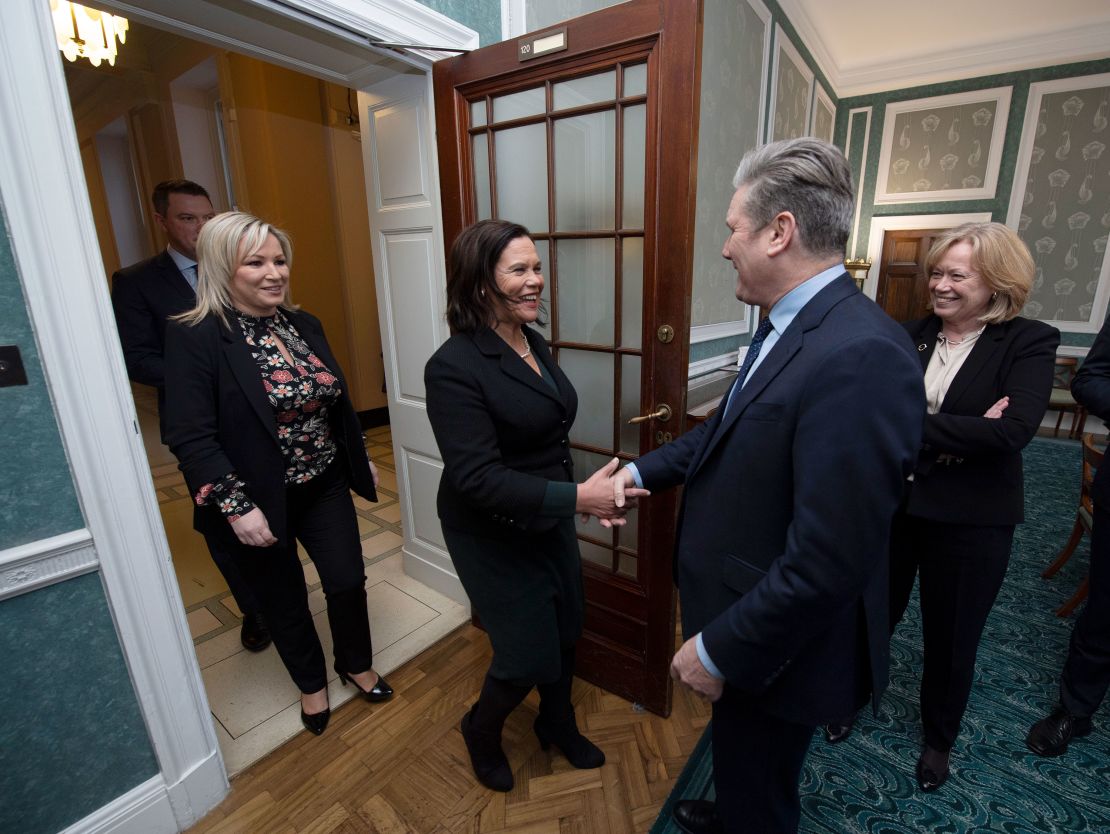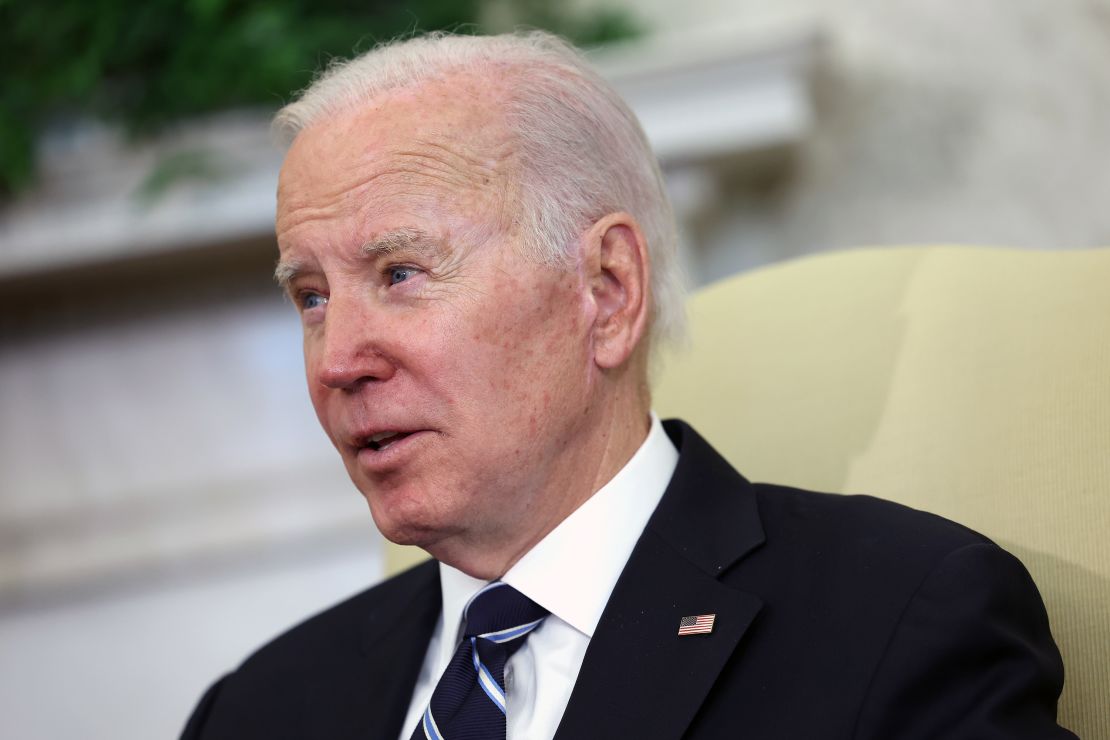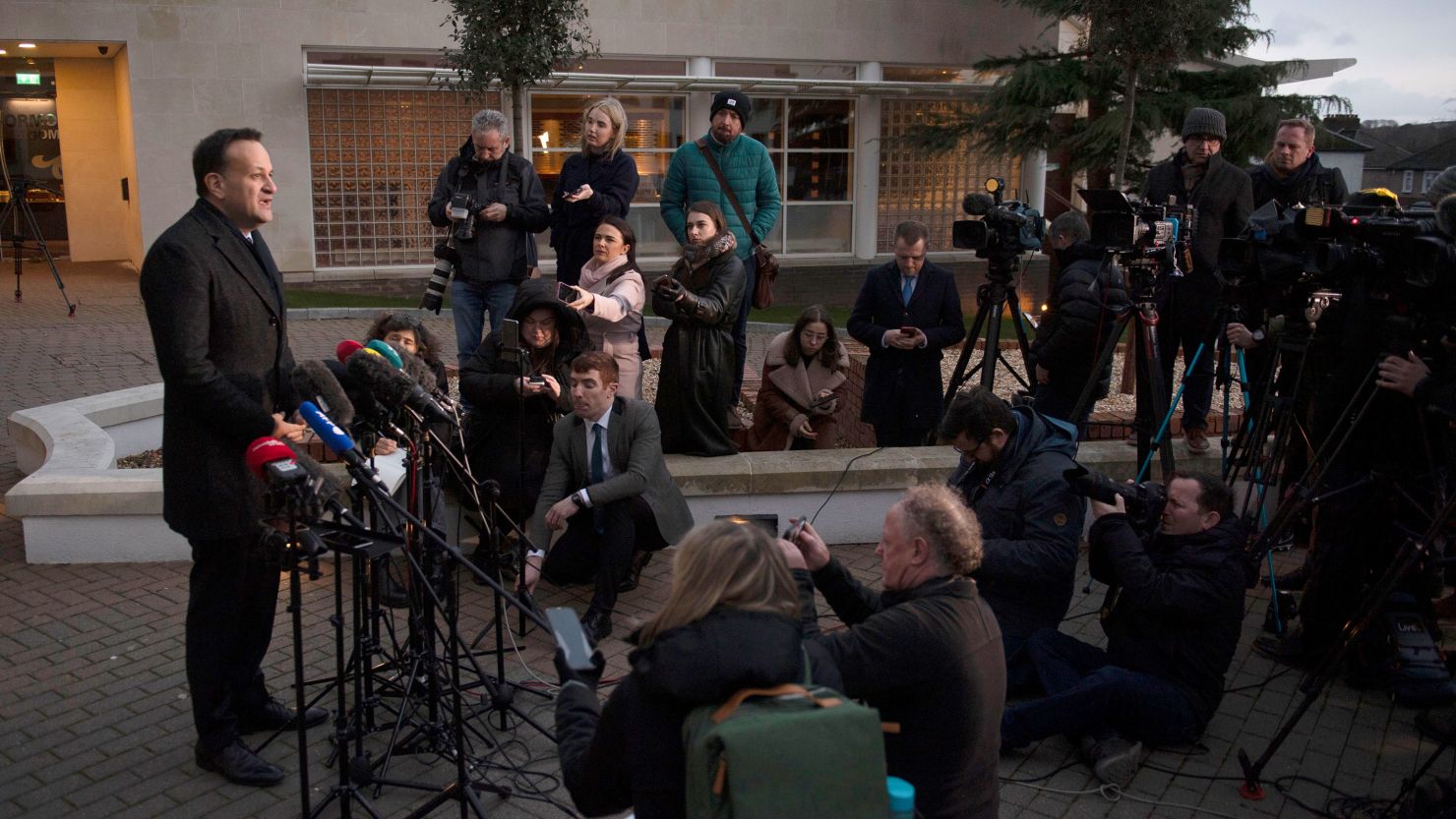There has been a dizzying Brexit buzz in Northern Ireland this past week.
A prime minister, two foreign ministers, another top minister and a major opposition leader have all visited the country, raising speculation of a long-awaited attempt to break the last major political logjam.
The challenge is complex: Fixing the European Union-United Kingdom relationship and mending Northern Ireland’s broken politics, while getting its power-sharing government back up and running, all before extremists potentially hijack the impasse and threaten decades of peace.
The holy grail would be a solution to revise the Brexit Northern Ireland Protocols – the trade controls that effectively put a border down the Irish Sea – that the EU, the UK and all Northern Ireland’s political parties can all agree to. So far compromise is elusive, a path to resolution as clear as the Irish mist, over a peat bog.
Nevertheless the renewed push is fueling speculation that US President Joe Biden may visit Northern Ireland if a deal can be reached by the 25th anniversary of the Good Friday Agreement that ended three decades of bloodshed.
Biden’s interest is many fold. The US helped broker the original deal, he has strong Irish roots and has made clear the UK’s handling of Northern Ireland and Brexit damages prospects of a quick US-UK trade deal.
Late last year, he appointed a special envoy to Northern Ireland, Joe Kennedy III, to help the economy and build “on the long-standing US commitment to supporting peace.”
A Biden visit could be a boon for Northern Irish business, says Stephen Kelly, CEO of industry umbrella group Manufacturing NI, “given his own personal investment in Ireland and the northern part of the island in particular, that would be incredibly powerful.”
Kelly says he feels positive about the new political momentum and is hoping for the best, “with the eyes of the world on us, from that kind of April time onwards, we’ve really got to capture that opportunity.”
This coming week the UK’s top diplomat, Foreign Secretary James Cleverly, is due to visit Washington. He has been at the vanguard of this week’s Brexit bridge-building, undoubtedly with an eye on the economic prize of repairing relations.
Last Monday, Cleverly met the European Commission’s Brexit point-person Maros Sefcovic, offering the bloc a previously withheld concession: access to some UK customs data that could begin to ease post-Brexit tensions over the Northern Ireland protocols that control trade between mainland UK and Northern Ireland.
Cleverly is the third foreign secretary since the UK officially exited the EU three years ago, itself an indication of the scale of the Brexit muddle left by his predecessors.

Hard-won peace deal
Most economists say Brexit has cost the UK dearly, so fixing the protocols has become a priority for the whole of the UK – not just Northern Ireland – and it’s Cleverly’s turn to take a shot at fixing it.
Time is running out to do it before the April 10 anniversary of the Good Friday Agreement, but maybe that’s all part of a bigger gambit, be it by Cleverly, Biden or someone else.
There could be good historical precedence for it.
After former US President Bill Clinton’s special envoy, former US Senator George Mitchell, helped deliver peace to Northern Ireland, shepherding the historic agreement over the finish line in 1998, he explained to this reporter that the key to his remarkable success rested on two things: Getting the sides to believe a deal was possible and most importantly setting a deadline for it to happen.
The 25th anniversary of Mitchell’s hard-won peace deal is only a few months away and could be a poignant deadline for the latest Brexit talks.
British officials acknowledge it’s an important milestone on the potential road to prosperity for Northern Ireland.
Mitchell’s deadline had been Good Friday 1998 – and he only missed it by a couple of hours.
The ground outside the drab negotiating building had frozen hard as the April 9 deadline teetered into April 10. Inside, having convinced the party leaders they could manage a compromise, in the wee hours of Saturday morning he cajoled them over the line, finally softening long-held positions.
A deal had been tantalizingly close for years, but Mitchell’s simple formula he outlined to me brought the thaw that was needed.
Indeed so obvious had been the outcome, concessions on both sides, in the parlance of the province’s customary dark humor, the agreement was jokingly described as “Sunningdale for slow learners,” a reference to another similar peace deal tabled 25 years earlier.
Mitchell’s accomplishment is the stuff of legend, but it didn’t satisfy everyone. Indeed the Good Friday Agreement, as it is often referred to by Catholics, is still known as the Belfast Agreement by most Unionists.
Mitchell’s success was profound, paving the way for a power-sharing government at Stormont, giving Northern Ireland’s people and politicians power to run much of their own lives after over two decades of direct rule from London.
Yet this tiny corner of the UK, with a population of 1.9 million, remains divided, hostage to its history and hardliners tethered to the past.
Polarizing effects of Brexit
The power-sharing assembly, the prize of the Good Friday Agreement, bringing together Catholic, mostly Irish nationalists and Protestant, mostly pro-British Unionists isn’t functioning.
Following local elections last year, pro-British Unionists of the Democratic Unionist Party (DUP) have refused to rejoin the assembly, because they say they are unhappy with the Northern Ireland protocols, which effectively left the province in the European single market after the rest of the UK left.
They say the protocols break the cross-community consent terms of the agreement, which also allows an open border with Ireland and both Unionist and Nationalist to be both British and Irish.
But there is another interpretation of why they won’t go into the power-sharing government.
At local elections last May, the majority Catholic Nationalist, pan-Irish party, Sinn Fein won the most seats. It was a first in Northern Ireland’s 100-year history, allowing them to take the top political position, first minister, which until then had always been held by a Unionist.
Brexit was a natural enemy for the Good Friday Agreement, it has helped polarize and reinforce identity politics the peace deal had tried to lay to rest. It adds another layer to the complexity of finding a solution to the protocols.
The majority, including most nationalists and some Unionists in Northern Ireland rejected Brexit in the 2016 vote, with 56% voting against. Hardline Unionists were for it, their calculation, disconnecting from the EU would lessen the chance of a united Ireland, a possibility that is slowly becoming much more likely.
Cross-community consensus didn’t come into Brexit calculations, as a majority of those who voted across the UK, 52% were in favor. The entire UK moved as a whole, but when then-Prime Minister Boris Johnson agreed final terms with the EU he did so at the expense of that whole, and of Unionist wishes not to have customs checks across the Irish Sea.
When Cleverly joined his junior minister, the UK’s Minister for Northern Ireland Wednesday on a visit, he did so knowing almost any steps he takes to seek compromise with the EU risk angering hardline Unionists.
Jeffrey Donaldson, the leader of the DUP laid out his position before Cleverly’s arrival: Replace the protocol “by arrangements that restore Northern Ireland’s place in the UK internal market and our constitutional position is respected.”
Only when the protocol is fixed to his party’s satisfaction, he says, will they allow the power-sharing government to resume.

Mood for agreement
Cleverly’s delicate mission was unexpectedly thrown off kilter when he refused to meet Sinn Fein’s President Mary Lou McDonald, a chain reaction followed and all the other nationalist politicians refused to meet him.
However he did meet business people and Unionist lawmakers, where his tone was cautious, telling them, “there are still genuine differences [over Brexit] and they can’t just be wished away.”
Donaldson acknowledged Cleverly’s progress with the European Commission’s Sefcovic but said: “The EU is going to have to give more ground.” And his takeaway from his talks with Cleverly: “I don’t think we are anywhere close to a deal.”
Hard on Cleverly’s heels was Ireland’s Taoiseach, or Prime Minister, Leo Varadkar, his Foreign Minister and former Prime Minister Micheal Martin as well as the leader of the UK’s opposition Labour party, Kier Starmer, who all visited Belfast for talks.
That they’ve all come signals the mood for moving forward is gathering pace.
Varadkar notably kicked off the year with conciliatory messaging saying “lots of us made mistakes” over Brexit, “the way the protocol was implemented was too strict and too rigid and I think that created real difficulties.”

Tantalizingly, Biden’s Ambassador to Ireland Claire Cronin told a local broadcaster in late December, “I have no doubt that President Biden will be coming to Ireland at some point in 2023,” although she admitted she didn’t know exactly when.
If a potential presidential visit and a potential deadline for compromise is being created there are other reasons to think the wind may be in its sails.
As a British official framed it this week: Post-Brexit tempers have cooled. The focus is now on hard facts, specifically a global economic downturn in which the UK is not shaping up as strongly as its EU neighbors.
There are signs that this may be translating into pressure on the DUP. The UK government is considering legislation that could start construction of new customs facilities at ports handling goods from mainland Britain, and run roughshod over the DUP’s efforts to stymie protocol enforcement.
Cleverly himself seemed to hint that getting a deal with the EU ultimately outweighs DUP objections. “Having the parties coming back to Stormont and getting resolution on the Northern Ireland protocols are not necessarily interlinked,” he said.
A day before traveling to Washington on Tuesday, Cleverly has another meeting with Sefcovic. If they make more progress, talks will enter what’s termed “the tunnel,” meaning effective radio silence on negotiations.
Undoubtedly, President Biden will be paying attention when Cleverly arrives. There is no sign he’s booked his trip to Ireland just yet though.




